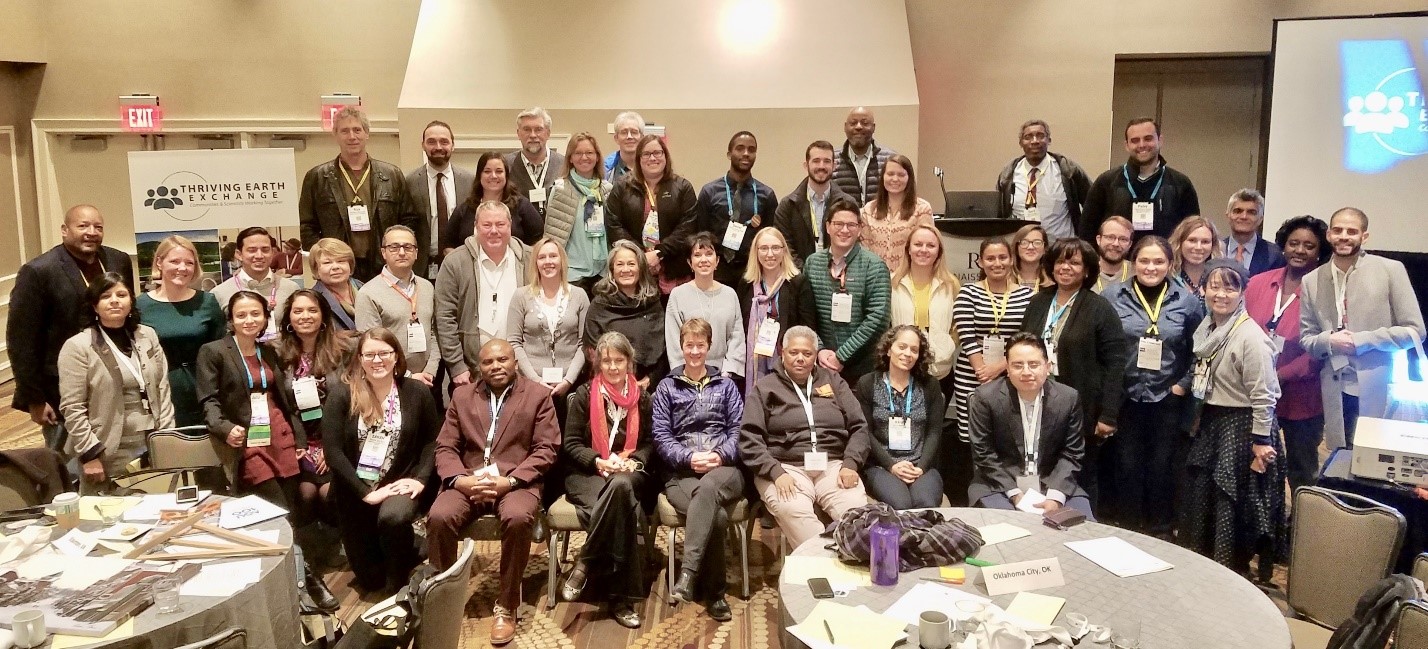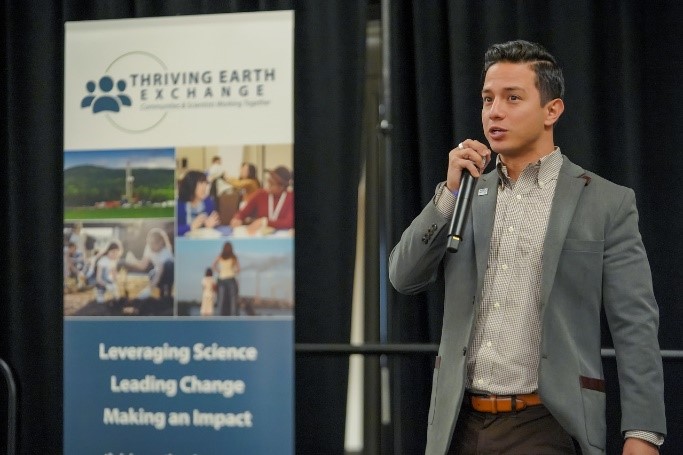By Zack Valdez
Zack Valdez recently wrapped up a six-month contract position as Project Manager for Thriving Earth Exchange

Zack (second row, third from left) at the Thriving Earth Exchange project launch workshop during AGU Fall Meeting 2018
Despite an early enthusiasm to engage and share science with people around me, in graduate school I was tucked away in a lab conducting research for a small cohort of scientists focused on peer-reviewed publications. “I love science… I love science…” I would remind myself. After all, since starting college, I continued organizing STEM outreach events, teaching educational summer camps and enjoying sharing and unraveling STEM research and news articles with friends and family during holidays. I assumed most scientists were equally interested and relatively savvy in sharing their science and clarifying other “nerdy” news too!
In fact, I started my Congressional Science and Technology Policy Fellowship in the U.S. Senate in September of 2017 assuming my ability to communicate science would provide Congress with everything they needed for sound policy-making. I was wrong. I realized changing hearts and minds is NOT purely a function of facts and figures. There is a role for strategy, messaging and compassion that science inherently lacks because science doesn’t take sides. Science doesn’t consider affected populations, associated costs or WHY the greater public should care. It’s fundamentally objective.

The AGU Fall Meeting 2018 project launch workshop brought together community leaders and scientists
Recently, I participated in a panel at a national conference and asked the group of 60 college students in the audience, “How many of you can explain your research or science to a grandparent, younger cousin or stranger in 30 seconds AND create enough interest to merit questions?” Ten, maybe 15, students raised their hands. This was not for a lack of care about their science, strangers or grandparents, but, in my experience, a disconnect between the execution, application and communication of science. The science within university research programs rarely reconfigures for public use and even less for general consumption.
So, I guess I shouldn’t have been surprised by the recent posture of public distrust and anti-science movement during my year on Capitol Hill, and although I felt I should defend science, maybe my mission was to improve public confidence in science. Everyone assembles in awe at the discovery of new planets, mind-controlled drones or autonomous vehicles, but some remain skeptical about GMOs, benefits of vaccines or anthropogenic climate forcing. I feel people should be able to think and say as they choose, but as a scientist, how can I communicate the accumulated technical knowledge and scientific consensus to engage others to appreciate its robust and thorough nature?
We (scientists) must meet with people on their terms, listen to their concerns, acknowledge their doubts and not bombard them with facts or force our agenda or level of understanding. We must acknowledge uncertainty and unanimity for vast amounts of data and increase transparency by listening to the priorities or issues people face and strategically catering our message so that it’s useful to them.

Zack emceeing for the Thriving Earth Exchange Reception at Fall Meeting 2018
If we spend more time out of the lab and, just like in politics, get involved within our communities, this can be accomplished and public confidence in science can be restored. We can strengthen ties in the places we work, play, eat and pray through re-evaluating our approach and learning what our communities care about and how science can provide insight, because science is not the only answer. I wanted to explore the world outside of academia, support science within society and engage with people and projects that went beyond basic research.
My tenure at Thriving Earth Exchange assured that science prioritize community challenges first and create distinct and tangible impacts to improve the world around us… Isn’t that the point of science anyway?

1 Comment
HeidiMay 23, 2019 at 10:49 AM
Amazing think piece. I agree wholeheartedly on the disconnection between the research community and the rest of the Earth population. When we are frustrated with how “dumb” and “stubborn” non-academic folks are when it comes to understand climate change, your paper is a reminder of why we usually fail in convince people of what we think is going to happen.